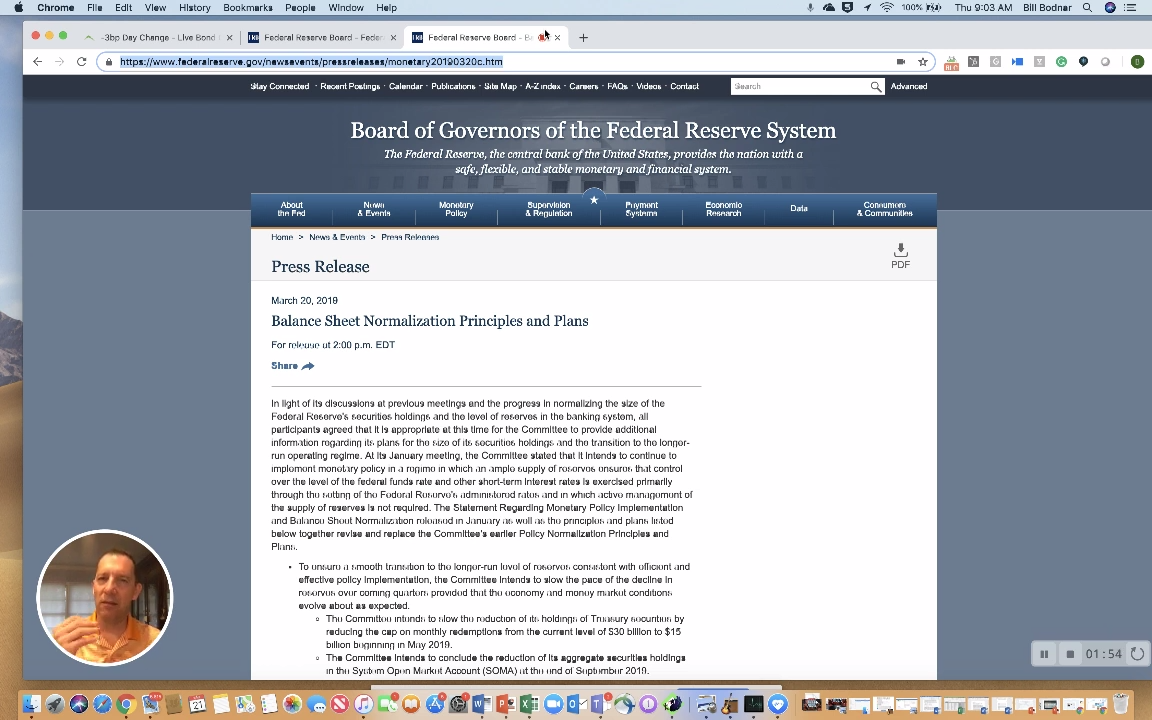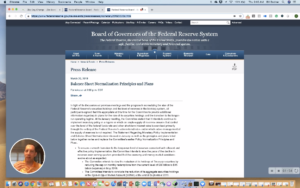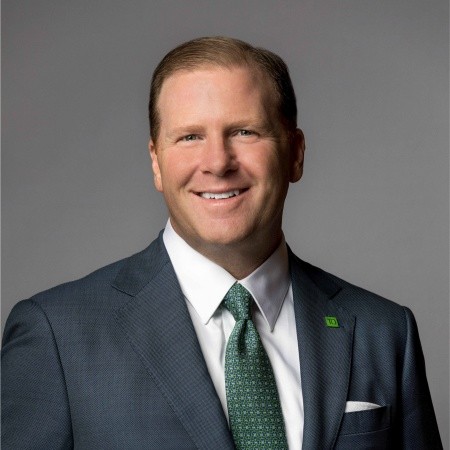OTHER NEWS
The Learning Center
Our Learning Center ensures that every reader has a resource that helps them establish and maintain a competitive advantage, or leadership position. For instance, loan originators and brokers will have one-click access to resources that will help them increase their productivity. Search topics by category and keyword and generate free videos, webinars, white papers and other resources. If you would like to add your content to the learning center, please click here or email Tim Murphy at [email protected].

matt
Bodnar: Fed Is More Dovish Than Market Anticipated
- Wednesday, 20 March 2019

Hi Bill Bodnar here from the Mortgage Market Guide.
Thanks for tuning in to our MMG recap, so this week it was all about the Fed. Now the Fed came out, of course, they didn't raise rates. It wasn't expected, but their statement, believe it or not, was even more dovish than the market was anticipating.
I think the some of the text wasn't a big change: You know they already committed to inflation being low and that that was not a surprise. They did say that the economy is slowing a bit.
But I think the big thing is they removed a rate hike off the table for 2019. Now if we go back just a few months, back in October, the Fed was on a path to raise rates three times in 2019. And it was happening regardless of the data, so this is a big change.
[adbutler zone_id="326324"]
[adbutler zone_id="326327"]
So we're not going see a rate hike in 2019, which is you know, giving stocks and the bond market a sigh of relief. But what they also said is that they forecast one next year. So if you're sitting here in the mortgage business, we're looking at maybe one rate hike between now and the end of next year, which is really a remarkable big change. That's why we're seeing the bond market move higher.
Stocks even move higher a bit, and the other thing that they mentioned is the balance sheet. You know they have seven trillion-dollars-worth of bonds mortgage-backed securities. They are not going to reinvest the money back into those as those bonds roll off those mortgage bonds.
[caption id="attachment_11177" align="alignleft" width="300"] Bodnar: Wage growth is accelerating at 3 percent to four percent, which can cause inflation.[/caption]
Bodnar: Wage growth is accelerating at 3 percent to four percent, which can cause inflation.[/caption]
They will be reinvested into the Treasury market, so the Fed ultimately isn't allowing mortgage-backed securities to roll up their books not a big negative for the mortgage bond market. But I think you know the fact that the Fed is, you know removing that tightening of that roll off of the balance sheet again as a positive for the financial markets.
What we get out of this week is that the complacency tone that we've discussed. When we talk about complacency, what do we mean? You know the lack of volatility it's being spurred by the fact that the Fed, interest rates and inflation are not a threat.
Rates aren't going higher, inflation is not a problem for now. Rates will kind of be where we are right now, which you know if you take a look at the chart. Basically, one-year highs in price, one-year lows in rates, and this is a little bit of a breakout that we're trying to make heading into the weekend.
It’ll be interesting to see if it sticks and at the same time, they're watching the yield on the 10-year note, which had a real bad problem--impossible to get beneath 260. You know down the low 250s as we speak, so really good story heading into the spring housing market.
But what we must remember is that complacency is always followed by volatility right, and so it will change. And so the one thing you know we said: Inflation is not a threat; that's the one threat that we're watching here at the Mortgage Market Guide because we're watching commodity prices up anywhere from 10 percent to 15 percent.
So far this year we're watching wages running at three point to four percent, year-over-year, the hottest in a decade. And that can be inflationary and I'll tell you where one solid print on inflation that would absolutely spook the bond market, so you know I would be talking to clients. I would certainly want to be advising them you know of this good story heading into the spring housing market but I wouldn’t remain complacent for long, because this story will change.
And guess what, next week there are a couple of big numbers to look at: No.1 GDP will be out next week as well as the personal consumption expenditure index, which is the fed’s favorite gauge on inflation. How that number goes is something that the Fed watches carefully. But it’s a number that can move the market because inflation is the big thing to watch right now.
Thank you for tuning in to the MMG recap, and we'll be back at it next week.
Bye for now.
Read more...TD Bank: Med School Debt Makes Home Buying Difficult
- Thursday, 21 March 2019

Around 25 percent of medical doctors who own homes say their student debt made buying a home more difficult, according to a new survey by TD Bank. Of those that don't own a home but plan to buy one, one in six are worried that student debt will make the process more difficult.
TD Bank has unveiled a Medical Professional Mortgage Product, that’s designed to alleviate the issues by accounting for the unique challenges doctors who are in the early stages of their career face buying a home.
According to the survey, just under one in five medical professionals are aware of Medical Professional Mortgages, meaning they could be missing out on the opportunity to leverage a product that is tailored to their unique financial needs.
[adbutler zone_id="326324"]
[adbutler zone_id="326327"]
Considering medical school loans and earning potential, TD's dedicated product helps address physicians' and dentists' pain points by helping applicants qualify for higher loan financing than standard mortgages, allowing them to use their money for investing or paying off student debt while still reaching their home ownership goals.
"Medical professionals dedicate their lives to caring for the health of our communities and in turn spend many years pursuing higher education and building up debt," said Rick Bechtel, head of residential lending at
[caption id="attachment_11165" align="alignleft" width="300"] Rick Bechtel[/caption]
Rick Bechtel[/caption]
TD Bank. "We dedicate the same amount of care to designing products, such as TD Bank's new Medical Professional Mortgage, which alleviates some of the biggest challenges those in the medical field face following graduation and residency, such as large amounts of debt and a lack of earning history."
This competitive new offering, available in both fixed and adjustable rate options, provides the following features for practicing physicians and dentists, fellows and third-year residents:
- Applicants may secure 100 percent financing. This was among one of the most appealing features according to the survey, with 44 percent of respondents selecting this option.
- No private mortgage insurance is required, another appealing feature selected by 44 percent of respondents.
- Applicants may take out a maximum loan amount of up to $750,000 with 100 percent financing or up to $1,250,000 with only 5 percent down. Only 18 percent of respondents were aware that medical mortgage offerings offered loans up to $750,000, indicating a need for further education in this area.
- Applicants may have flexible debt-to-income ratios, depending on income.
Eligible borrowers of TD's Medical Professional Mortgage Product include licensed residents with a minimum of two years of completed residency and fellows; as well as practicing dentists and physicians and who are less than 10 years out of residency.
Read more...First Quarter Good Time to Buy Home: Realtor Survey
- Wednesday, 20 March 2019

More Americans believe that now is a good time to purchase a home.
Consumer opinions about home buying bounced back in the first quarter of 2019, with 37 percent stating that they strongly believe now is a good time to buy, up from 34 percent in the last quarter of 2018, but down from 38 percent one year ago, according to a survey from the National Association of Realtors.
Only 35 percent of respondents said that now is not a good time to buy a home, compared to 37 percent in 2018's fourth quarter.
NAR's first quarter Housing Opportunities and Market Experience survey determined that a majority of those polled, 53 percent, said that the economy is improving--down from 59 percent at the end of last year. In 2019, optimism is the greatest among those who earn $100,000 or more and those who reside in rural areas. Fifty percent of Generation X said the economy is improving, while 42 percent of urban area residents reported the same.
[adbutler zone_id="326324"]
[adbutler zone_id="326327"]
NAR's says several factors are helping to improve the attitudes of potential homebuyers. "First, inventory has been rising, so those buyers interested in making a purchase will not be limited in choices,” said Lawrence Yun, chief economist at NAR. “Additionally, more stable home price trends are leading to more foot traffic at various open house gatherings."
Quarter four of 2018 broke the trend for respondents who thought home prices had been steadily increasing over the last 12 months. The first quarter of 2019 followed that trend, as 61 percent of respondents said they think home prices in their communities have increased over the last 12 months; a drop from 63 percent in 2018's fourth quarter. Thirty-one percent said prices within their community had remained the same, unchanged from a year ago.
This quarter's survey asked respondents to look ahead regarding local housing prices in the near future. Forty-three percent said they expect prices in their communities to stay the same over the next six months, up 2 percent from last quarter. However, 47 percent believe prices will rise in the coming six months, while 10 percent believe prices will drop in the next six months.
Those who live in the Northeast and South, those who earn $50,000 to $100,000, or those who rent are most likely to believe prices will increase in their communities. The West is experiencing the most variation in expectations surrounding home prices.
"A high percentage of the Western population believes that prices increased in the past year, while possibly for the same reason, a higher segment from the West compared to other regions say prices could fall in the next 12 months," said Yun. "As to the broader economy, the perception is weaker and showing cracks in the Midwest."
Amid those polled who do not presently own a home, 27 percent believe it would be very difficult to qualify for a mortgage given their current financial situation; 28 percent said it would be somewhat difficult to qualify. Twenty-four percent of that group said they expect no difficulty at all in qualifying for a mortgage; up significantly from 21 percent last quarter and 19 percent this time last year.
Mortgage affordability in 2019's first quarter has been more favorable for would-be homebuyers than it has been in recent quarters. "The Federal Reserve's decision to refrain from any foreseeable rate hikes was beneficial to potential buyers," said Yun. "That move directly contributed to mortgage rates declining in quarter one, which provided a second-chance opportunity to those looking to buy who were priced out last quarter."
Read more...
